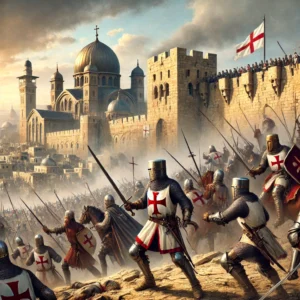 On July 14, 1099, the city of Jerusalem was captured by the crusaders of the First Crusade, concluding a grueling five-week siege that began on June 7th. This historic and brutal event marked a pivotal moment in the Crusades, as the Christian forces, driven by religious fervor and the desire to reclaim the Holy Land, breached the city walls. The capture of Jerusalem was accompanied by a horrific massacre of the city’s Muslim and Jewish inhabitants, a stark and violent testament to the deep-seated hostilities and religious intolerance of the era. The crusaders’ victory was celebrated by Christians throughout Europe but left a legacy of trauma and bitterness among the city’s survivors and the broader Muslim community.
On July 14, 1099, the city of Jerusalem was captured by the crusaders of the First Crusade, concluding a grueling five-week siege that began on June 7th. This historic and brutal event marked a pivotal moment in the Crusades, as the Christian forces, driven by religious fervor and the desire to reclaim the Holy Land, breached the city walls. The capture of Jerusalem was accompanied by a horrific massacre of the city’s Muslim and Jewish inhabitants, a stark and violent testament to the deep-seated hostilities and religious intolerance of the era. The crusaders’ victory was celebrated by Christians throughout Europe but left a legacy of trauma and bitterness among the city’s survivors and the broader Muslim community.
The successful capture of Jerusalem had profound and far-reaching religious and geopolitical repercussions. The city, revered by Christians, Muslims, and Jews alike, became the center of the newly established Christian Kingdom of Jerusalem. This new political entity was one of several Crusader states founded in the aftermath of the First Crusade, serving as a foothold for European powers in the Middle East. The establishment of the Christian Kingdom of Jerusalem was seen by many in Christendom as divine validation of their cause, fueling further crusading efforts and military expeditions to the Holy Land in the years to come. This period also saw significant cultural and military exchanges between the Western and Eastern worlds, although often marred by conflict and conquest.
The capture of Jerusalem entrenched the conflict between the Christian and Muslim worlds, setting the stage for centuries of intermittent warfare and crusading efforts. The brutality of the siege and the subsequent massacre left a lasting scar on the region’s historical memory, influencing relations between the two religious communities for generations. The First Crusade and the fall of Jerusalem are often cited as key events in the broader narrative of Christian-Muslim relations, exemplifying the extremes of religious zeal and the devastating consequences of religiously motivated warfare. Despite the passage of time, the legacy of these events continues to echo in contemporary discussions about interfaith relations and the historical roots of conflicts in the Middle East.
